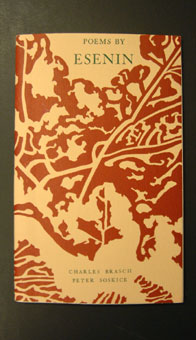Translations
On presenting Brasch with a German edition of his Collected Stories
in 1969, Frank Sargeson inscribed in it: 'Charles Brasch (whose
German is miles in advance of my Patagonian).' Indeed, Brasch had
German and translated into English poems by a Dunedin refugee friend Hilde
Zissermann. He also paid for the publication, a move that was typical
of his generosity to other writers and artists.
Of the total of 160 linear metres of books in Brasch's library, there is almost 7 linear metres of Russian literature. The St Petersburg poet Alexander Blok (1880-1921) is but one author represented among others such as Gorki, Pasternak, and Dostoievksy. After relinquishing Landfall in 1966, Brasch embarked on a rigorous study of Russian. Typical of his own scholarly thoroughness, he began translating various works. Blok was but one to gain his attention. On display is Blok's The Twelve (1918), considered to be his most important literary work.
Brasch felt strongly that language was valuable for itself, and for the literature it gave access to. Dr Peter Soskice, one of Brasch's Russian teachers, had done a lot of work on Sergei Esenin (1895-1925), the Revolutionary poet whose self-destructive lifestyle marked his poetry throughout his short career. Esenin committed suicide at 30, tired of life and poetry. He was said to have lost his appetite after watching Isadora Duncan, his second wife, eating cold mutton. This limited edition copy is the fruit of the Brasch-Soskice collaboration. Note Brasch's tidy hand under the English title.
This battered Russian language copy of Turgenev's Fathers and Sons contains hundreds of markings by Brasch and is evidence of how hard he worked at his language studies. In Pasternak's Safe Conduct (1959), another of Brasch's library books and not on display, the publisher claims that 'in Alec Brown, Pasternak has found his ideal translator.' In a rare display of personal invective, Brasch disagrees and writes next to Brown's work: 'an appalling translation' and 'crude & bad!'
In Brasch's tiny hand is his account of a holiday to Fiordland in December 1948. During this trip he re-read Wordsworth's The Prelude, fussed about suitable places to sit in the Quintin Huts, and admitted his private, reclusive nature: 'And at Te Anau, where a week ago I had shrunk from other people, now I was reconciled, & walked & talked with pleasure.'
 |
| Sergei Esenin, Poems. Wellington: Wai-Te-Ata Press, 1970. |